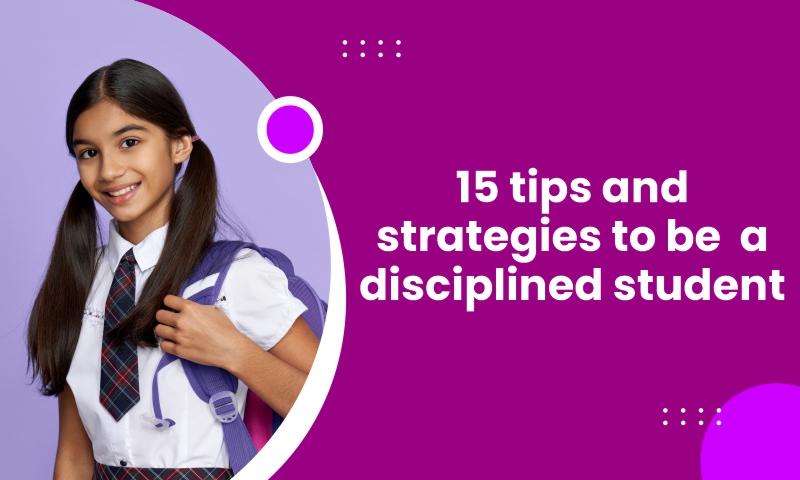As students, you have multiple classes to attend, assignments to complete on a rotating basis, and exams to prepare for. You have a lot of work and it always feels like you have less time to do it. There are many things competing for your attention, things you would rather do than pick up your text book.
But doing that also makes you feel guilty, for wasting time. You think to yourself, ‘if only I had more self-discipline’…
To have self-discipline is essential for a student, especially in college where the course is less structured and requires more effort from the student.

So here are 15 tips to build discipline.
1.Know where you shine and where you lack.
Are you always avoiding literature but you hit the ground running when it comes to maths? If you know which are your strengths and weaknesses, what you enjoy and what you don’t, you can better make strategies for yourself.
If you already know that the upcoming subject you need to study is where you struggle, you can make a plan to limit distractions and schedule a regular time slot for that particular subject.
2. Know when you are at your peak
All of us have moments when we feel at our peak and are able to perform to any task with ease. Be observant of those times and try to notice what makes it work for you. Did you a good night’s sleep or avoid coffee that morning? Did you have a hearty breakfast before beginning work? Have you been working out since past few days? It can be anything.
Take notice of which factors increase your productivity and motivation. And then make plans to repeat these factors as often as you can.
3. Recognise where you fall short
Is there always a certain time of day when you feel least motivated to study or work? Does something happen during the day which distracts you every time? It can be a heavy lunch and the drowsiness afterwards or somebody coming home at a particular time. Take note of these moments and schedule your plan accordingly to avoid these pitfalls.
4. Change your environment
A common mistake we all make is we try to change ourselves while taking up a new habit or trying to get rid of one. Changing ourselves is hard. What is easier is changing our environment. For example, have you noticed how easy it is to remain focussed on working out in a gym as compared to doing it at home where there are multiple disturbances? Or how easy it is to focus in a library where everyone is silently concentrating?
You don’t have to go to the library to study but you could designate a specific place in your house for study. You will get more work done this way.
5.Build up your willpower with a small dose everyday
You can build up your will power with habits. All you need to do is perform a small task everyday which you don’t enjoy. It can be anything like taking the stairs instead of the elevator, taking a cold shower or studying a small chapter of a subject you don’t enjoy. Doing one small thing that you dislike, every day, can help build up the drive to do bigger things that you not otherwise be willing to. In a way, it is just like working out. Bit by bit, you are building your willpower muscle.
6.Know your own impulses
It is important to be aware of how you perform and behave throughout the day. You might perform your best during a certain time, feel tired at a particular time, and have massive hunger pangs at another. To perform at your best you need to prepare ahead for these times and schedule your activities around your natural body cycle. Identifying your own self inclinations will help you become more self-disciplined if you work with them, not against them. When you start doing that, you will have to spend less mental energy on important tasks.
7. Just start!
Before beginning any big preparation, we try to optimise and figure out the perfect time to start. Despite much preparation, it becomes difficult to actually begin. We sit and wait around for the perfect time to start but the truth is there is never going to be a perfect time. Only when we start doing the work, we realise how to proceed and after that, we can set our perfect time according to our own need.
8. Develop a cue to get you in the groove
According to research, to successfully build a habit you need a cue to get you started, a response which is the habit you want to develop and a reward which motivates you repeat the process the next day. Your cue can be anything. For me it is making a cup of my favourite sweetened tea before beginning work, clear up my table so that it is clean and making a to-do list of what I need to finish today. Setting the cue is important. Once you do that, repeating the process everyday and becoming productive becomes easy.
9.Create a routine that works for you.
This is one of the best, time-tested tips for maintaining self-discipline in your life. A routine will help you maintain a consistency to your tasks. Once you have internalised the daily rituals, maintaining it will become effortless. This is how successful people repeat success consistently. They always have a routine which they follow diligently and through which productivity becomes effortless. Think about what kind of routine will help you to maximise your work towards your goals. You have to be realistic and establish a routine that you will likely follow.
10. Take regular breaks
Our brains find it easier to stay at peak performance for shorter periods of time. This is why you feel yourself getting fuzzy after half an hour or 20 minutes of rigorous studying. For best effect, you can try short bursts of learning. Our brains are not wired to do the same task for extended periods of time. Ideally, you can study for 20-30 mins straight and then take a break of 5-10 minutes. Do not extend it beyond 30 minutes even when you feel you could. Repeat this process several times before taking a longer break. Using this technique will give you higher quality of work in higher quantity.
11. Give yourself a reward after every study session
Dividing a huge workload into manageable chunks makes it easier to tackle and rewarding yourself after every session ensures you do not feel overwhelmed by all the work. As mentioned earlier, setting a cue for your study sessions and ending with a reward is essentially creating a habit loop. In such loops, each cue, response, and reward form fundamental elements that enable us to start and maintain habits.
12. When are you at your most productive?
Another factor to remember in this journey is to evaluate and keep track of what works for you and what doesn’t. That will help you to identify the time when you are at your best. For starters, you can ask yourself few questions to get to know yourself better. For example, what kind of environment works for you the best, the time of day you think is the best time to work, the way you absorb information best, whether handwritten notes or typed notes work better for you. Discovering your personal preferences can help you to use them to your advantage.
13. Anticipate obstacles! Plan accordingly!
What happens when you plan your study routine perfectly down to the last paragraph but your out-of-town relatives arrive in the middle of the day on short notice and suddenly you are sharing your room with your two cousins? Such incidents happen and if you want to carry forward your studies seriously you need to be prepared for such distractions by making alternative plans that work for you.
14. Keep distractions at a minimum
Before you sit down to study, make sure you remove all sources of distraction. Clear your table as clutter can be distracting. If you are listening to music, it is advisable to listen to instrumental music as lyrics can be a distraction (But of course that’s based on your preference). If you are working on a computer, disable all browser and mail notifications or put Windows in focus mode.
15.Exercise!
This is always important. Regular exercise helps you stay focussed and improves your memory. 20 to 30 mins of exercise results in creation of new brain cells, helps improve connections between existing brain cells and improves abilities like problem-solving and attention. Exercise also results in the release of dopamine which is immensely important for your brain to function at its best.
Once you have a good handle on yourself, you will start reaping its multiple benefits. You will feel more in control of your life and will start achieving more of your goals. You can let go of habits like procrastination and other addictions allowing you to become more motivated towards your goals. Overall, you will feel more satisfied and content with yourself.
About The Author
A Gen-Z parent, study skill and Habit coach for students and author of “Toppers’ study hacks”, “Success blueprint for competitive exams” and “How to raise a topper”, Avinash Agarwal has been working in the area of mentoring for over 15 years. Interviews with hundreds of toppers who have cracked different competitive exams have led him to understand the topper mindset. He believes that every child can be a topper and through his sessions aims to teach powerful study strategies and techniques to students so that they can pursue their dreams.



 Useful for all Parents/Teachers
Useful for all Parents/Teachers 




